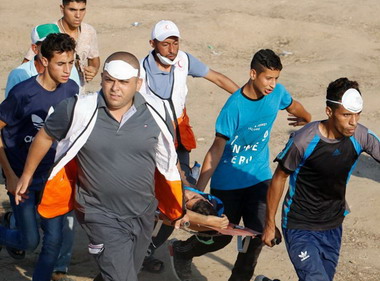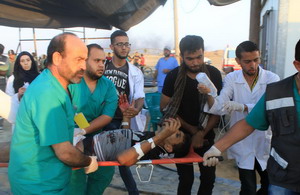 Gaza, 19 July 2018 – In response to increasing violence in Gaza, WHO is scaling up its response by providing life-saving medicines and medical supplies to hospitals and frontline trauma stabilization points. Since the start of demonstrations on 30 March, 148 Palestinians have died and 16 496 have been injured. To date, 500 000 emergency and trauma patients have been treated with supplies from WHO’s recent delivery of medicines, assistive devices and medical equipment.
Gaza, 19 July 2018 – In response to increasing violence in Gaza, WHO is scaling up its response by providing life-saving medicines and medical supplies to hospitals and frontline trauma stabilization points. Since the start of demonstrations on 30 March, 148 Palestinians have died and 16 496 have been injured. To date, 500 000 emergency and trauma patients have been treated with supplies from WHO’s recent delivery of medicines, assistive devices and medical equipment.
As Health Cluster lead, WHO is also supporting the Palestinian Ministry of Health in coordinating emergency medical teams to treat injured civilians who require immediate medical care. A Trauma Working Group has been established to improve trauma care along the pathway of the patient from point of injury in the field to rehabilitation.
 “The high numbers of trauma casualties, particularly with complex limb injuries, is continuing to increase,” said Dr Gerald Rockenschaub, head of WHO’s office for the West Bank and Gaza. “Trauma stabilization points are critical in saving the lives of people whose injuries are so serious that they may not survive the journey to a hospital. Almost half of all people injured so far have been treated and discharged by emergency medical teams at these points, significantly reducing the burden on hospitals, and likely saving many lives.”
“The high numbers of trauma casualties, particularly with complex limb injuries, is continuing to increase,” said Dr Gerald Rockenschaub, head of WHO’s office for the West Bank and Gaza. “Trauma stabilization points are critical in saving the lives of people whose injuries are so serious that they may not survive the journey to a hospital. Almost half of all people injured so far have been treated and discharged by emergency medical teams at these points, significantly reducing the burden on hospitals, and likely saving many lives.”
Of the 8695 people hospitalized to date, almost 50% suffer from gunshot wounds. Almost 20% of those being admitted to hospital are children. Psychosocial support is being provided to the injured, their families, and health care workers through 6 WHO-supported mental health teams.
Health care has also come under attack. Since 30 March, 2 health workers have been killed and 363 injured. Of the health workers affected, 26 were injured by live ammunition, including 2 health workers who were killed; 40 were hit with tear gas canisters; and 13 were hit with shrapnel. A health care centre for people with disabilities has been damaged, as well as at least 68 ambulances.
In addition to the ongoing emergency response, in the upcoming weeks WHO will support the establishment of an Ministry-led Emergency Medical Teams Coordination Cell and scale up of 10 trauma stabilization points across the Gaza Strip.
In times of violence when the services of health workers are needed most, WHO reminds all parties of the obligation under international law to protect health workers, as well as to allow the injured access to care and the medicines needed to treat them.
Related link
Situation report: occupied Palestinian territory, Gaza 12–16 July 2018


